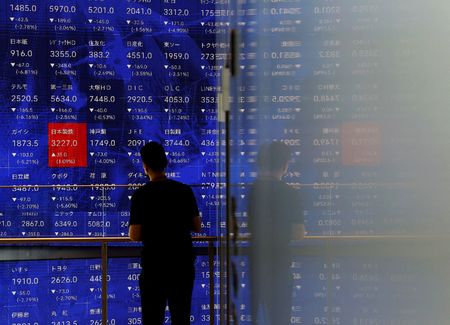By Makiko Yamazaki and Satoshi Sugiyama
TOKYO (Reuters) -Japanese leaders rushed to assuage concerns on Tuesday about the wild swings in the country’s financial markets, as the prime minister urged calm and senior finance officials convened an emergency meeting to discuss the global rout in stock markets.
Japan’s Ministry of Finance, the Financial Services Agency and the Bank of Japan (BOJ) will host senior officials at 0600 GMT to discuss international financial markets, they said in a statement.
The trilateral meeting is typically held in times of market turbulence, partly as a gesture of authorities’ alarm. A similar meeting was last held on March 27 this year following a sharp decline in the value of the yen. Officials, such as Atsushi Mimura, who became the country’s top currency diplomat just last week, is expected to attend.
Stocks tumbled across the world on Monday as a sell-off that began last week picked up momentum, only to recover some ground on Tuesday, leaving bruised investors feeling whip-lashed.
The Nikkei stock index soared on Tuesday in a relief rally after plummeting 12.4% on Monday, its biggest percentage sell-off since the 1987 Black Monday crash. It was up nearly 8% in early afternoon trading in Tokyo.
Japanese Prime Minister Fumio Kishida urged caution, saying it was important to make calm judgements about the market and the government will monitor market moves with sense of urgency.
Kishida said the government will continue to work on economic and fiscal management while working closely with the BOJ.
He also shared an optimistic outlook for the world’s fourth largest economy, citing factors like the first rise in inflation-adjusted real wages in more than two years in June.
“We recognise the Japanese economy continues to make a strong transition to a new stage,” Kishida told reporters in Hiroshima.
Japanese Finance Minister Shunichi Suzuki made similar remarks on Tuesday, saying the government would monitor and analyse financial market moves and work closely with relevant authorities.
“It’s important to realise resilient economic growth while responding to changes in front of us,” Suzuki said.
(Reporting by Makiko Yamazaki and Satoshi Sugiyama; Editing by Tom Hogue, Jacqueline Wong, Sonali Paul and Neil Fullick)





